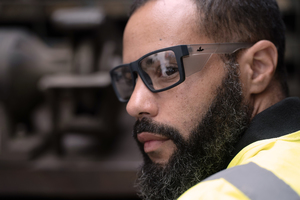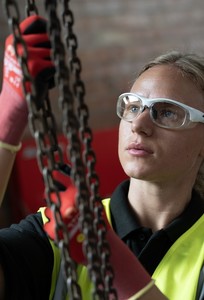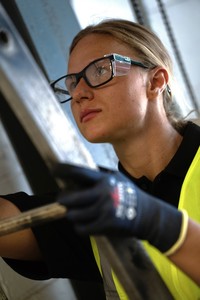
 |
Mark Sennett
Managing Editor |
 |
Kelly Rose
Editor |
Set your sights high
17 December 2024
There are many benefits of operating a managed corporate eyewear scheme. David Marmion provides an insight.

IN ORDER to operate a safe and efficient workplace with a happy and productive workforce, it’s essential to provide the appropriate Personal Protective Equipment (PPE) wherever it is needed. It is, of course, a legal duty of care for all employers, set in place by the Safety at Work Act. The Act clearly outlines the employers responsibility to carry out risk assessments identifying all potential hazards.
Eye protection in the workplace is crucial, most people fear loss or damage to their sight more than any other sense. To provide appropriate eye protection, employers must carry out thorough risk assessments to identify hazards such as flying debris, airborne particles or chemical splashes. Based on these assessments, suitable protective equipment must be provided free of charge to anyone exposed to the risk.
In the UK there are stringent safety regulations for eye protection governed by the European Standard EN166. This standard clearly outlines the requirements for all different types of protective eyewear to ensure they provide adequate levels of protection from impact, splash, airborne particles and other hazards encountered in the industrial environment. The standard also covers other elements like comfort and visual clarity. Risk assessments will identify which type of PPE is required, all providing a barrier between the eye and any potential threat of harm.
The Personal Protective Equipment Regulations stipulate that employers must not only provide appropriate safety glasses, goggles or face shields, they must also ensure that they are correctly used. Training should be given on proper use and maintenance of any equipment provided, to ensure that it remains effective and comfortable throughout its period of use.
Heavy industries like manufacturing, construction, automotive, aerospace, ship-building etc., encounter many significant risks to eye safety on a daily basis; employers in these sectors should be extra attentive in their provision and enforcement of eye protection. However, there is also risk to eye health in lighter industries and even in the office environment where eye-strain is a serious concern. The Health & Safety (Display Screen Equipment) Regulations state that employers should carry out risk assessments on each individual work station, ensuring that they are correctly aligned for healthy physical posture. Also, anyone using a Visual Display Unit (VDU) or Display Screen Equipment (DSE) must have regular eye-checks. Checks should be carried out by a qualified Optician, at the expense of the employer, to assess vision and general eye health. If an employee needs any specific spectacles for their VDU / DSE work, the employer must provide them and cover the cost. However, if the employee’s regular prescription glasses are sufficient, the employer is not required to pay for them.
Corporate eye care programmes
Many businesses operate a corporate eyecare programme in order to have control over the health and safety of their team. It can be challenging, especially for large organisations that may have teams based over multiple sites. It often involves a great deal of paperwork and correspondence with opticians who are operating externally to the business. It can also be difficult to keep track of employee’s prescription safety glasses orders or to know exactly when their eye-checks are due.
MCR Safety has addressed these issues with their online corporate eyecare programme known as EyeTicket. The programme can be managed internally within any business by a safety Officer, the HR team or department heads, these members of staff will become EyeTicket Programme Managers and can enjoy an enhanced level of control over corporate eyecare. EyeTicket will alert the programme manager when action is needed so there’s no risk of missing an employee’s eye-check date. It’s completely paperless and in just three easy steps, a prescription eyewear order for an employee can be raised. The programme can manage multiple teams across different sites from one single location. In these times of remote working, it could even be managed by someone based in their own home. The programme links to a nationwide network of Opticians, all fully briefed to operate the scheme.
The ‘EyeTicket’ is an electronic token that completely replaces the old-fashioned paper order form. The employee receives the EyeTicket via text message or email. All they need to do is book an appointment with their chosen Optician, whose contact details are contained within the EyeTicket, present the EyeTicket number (contained within their text or email) when they arrive, and leave the rest to the Optician. Because there’s no paper, it’s environmentally friendly too.
As the order is progressed, everyone involved is updated by text or email so the programme manager and the employee have full visibility. Eyewear orders are made in MCR’s UK based optical lab and dispatched within 3-5 working days. Everything is traceable from start to finish and complete order history for the entire corporate eyewear plan is kept securely in one place. Its accessible at the touch of a button and can be viewed at any time with no need to print and file paper order forms.
Alarming news about eye health in the UK
World Sight Day occurs annually in mid-October, it’s a day designated to raising awareness for blindness and impaired vision. In 2024, The Royal National Institute of Blind People (RNIB) chose this day to reveal the results of their latest research into UK eye health. Their research estimates that the number of people living with sight loss in the UK will increase by an alarming 27% by the year 2035. This worrying prediction is based on a number of contributing factors including increased life-expectancy, longer waiting times for diagnosis and treatment, plus the rapid rise in people being diagnosed with diabetes. They have called for a government focus on eye health, urging them to develop a national eyecare plan. They also continue to reach out to the public, strongly encouraging everyone to take more care of their eyes.
As sight is the sense people fear losing the most, everyone is invested in taking personal responsibility for their eye health. Having regular eye-checks is essential, the RNIB recommend that it should be done every two years, regardless of whether any change in vision is being experienced. Early diagnosis of any condition relating to eyesight is vital in the prevention of avoidable sight loss. If people are more aware of the importance of good eye health and regular eye-checks, this should naturally filter through to the work place. Heightened awareness may help reduce any workplace injuries caused by poor eyesight or from employees wearing glasses that don’t contain an up to date prescription.
A proactive approach to corporate eyecare
Sight issues can arise from underlying health conditions, but they can also be caused by the physical environment and failure to wear the correct and appropriate eye protection. The EyeTicket corporate eyecare programme is a great way of managing eye health for an entire workforce. The ability to never miss an eye-check is invaluable. Especially when it comes to identifying issues that may have gone unnoticed without professional intervention. An eye-check checks more than just vision, it also covers other aspects of eye health and can expose early signs of eye conditions such as Cataracts, Glaucoma or Macular Degeneration. The check may also reveal issues with general health such as Diabetes, high blood pressure, high cholesterol and even different types of autoimmune disease. Regular eye-checks will, of course, highlight the need for a prescription change. Wearing the correct prescription helps prevent eye strain which may in turn lead to other health and safety issues or simply cause headaches, discomfort and diminished ability to perform basic tasks.
When a business takes a proactive approach to their employee eyecare programme, it’s viewed favourably by employees. Having regular eye-checks with a qualified Optician, paid for by their employer, is often regarded as an additional benefit similar to health insurance or corporate gym membership. It can also be an attractive benefit as part of a wider company ‘Well-Being’ ethos and leads to people feeling valued as an asset to the business.
Benefits to the business are obvious, legal responsibilities adhered to, better health and safety records and a happy, healthy and productive workforce.
David Marmion is prescription eyewear category manager at MCR Safety Europe. For more information, visit www.mcrsafetyeurope.com
- Smarter PPE starts here
- Next generation cut resistance!
- ‘Second skin’ protection for precision work
- Geo-Flex – sophisticated dual nitrile hand protection
- Keep working hands warm
- Get ready for winter with Geo-Therm
- Hydroblast Goggle – Reliable, comfortable sealed eye protection
- Innovation-driven PPE for a safer tomorrow
- HydraTherm – keeps working hands warm!
- Mantis-D work glove – leaves no residue on clean surface


























